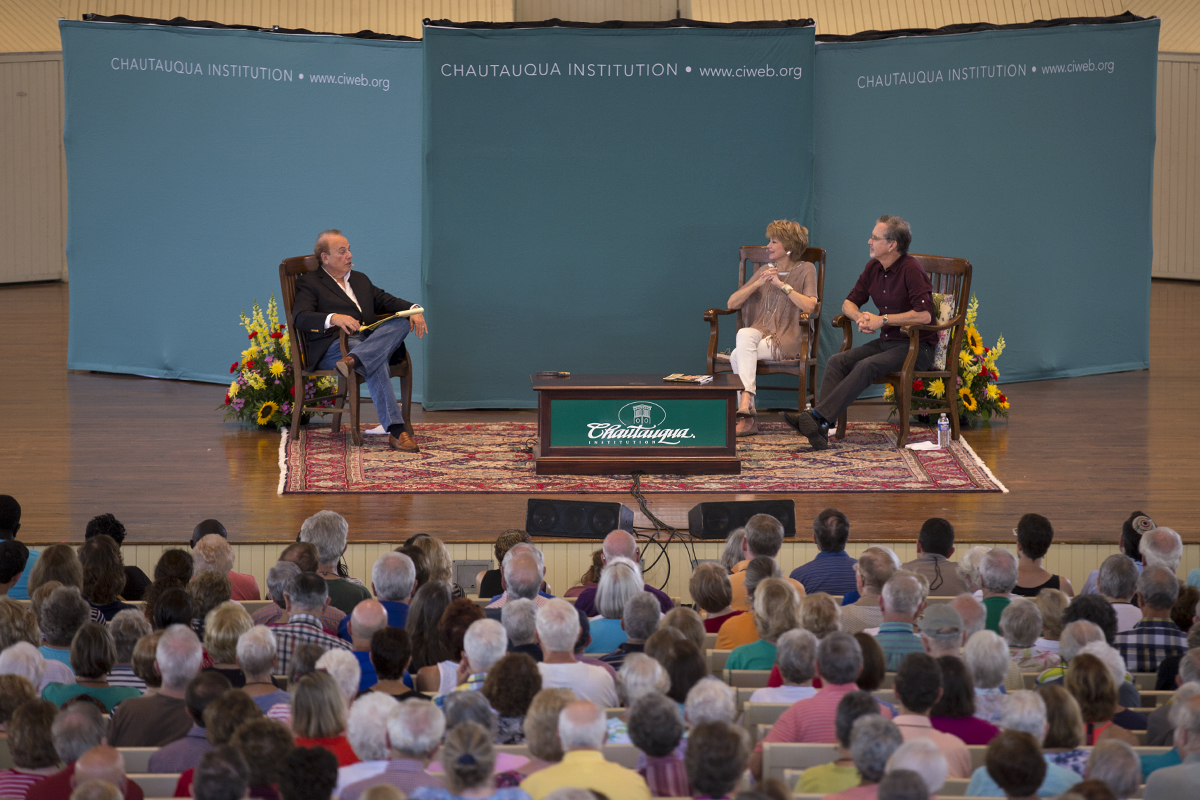Roger Rosenblatt, a well-known novelist, playwright, essayist and professor, first spoke at Chautauqua Institution in 1985. Nine years later, he delivered the second-ever Chautauqua Lecture, titled, “Why Write?” For more than 30 years, Rosenblatt has visited the Institution to discuss writing and working creatively. Five out of his 17 novels are Chautauqua Literary and Scientific Circle selections.
President Tom Becker presented Rosenblatt with the Chautauqua President’s Medal at the Monday morning lecture in the Ampitheater. Rosenblatt led a discussion about creative expression with Jane Pauley, journalist and anchor, and Garry Trudeau, the creator of “Doonesbury.”
“We start from the same place, where most writers start, which is out of curiosity,” Trudeau said. “We assemble around the table, and we read newspapers. We dive into the world around us, and it leads [Pauley] off into different directions than it leads me.”
Pauley, who is best known for her work co-anchoring NBC’s “Today” and as a “CBS Sunday Morning” correspondant said she looks at each story she is going to tell as a puzzle. Her goal is to solve the puzzle to allow the reader to connect with the story.
“Every story, in my book, is a different puzzle,” Pauley said. “It may seem to have very little to do with me or to do with the reader, but then, inevitably, you find that connection — that illumination that reveals something about yourself.”
Trudeau, who writes mostly satire, said his work differs from Pauley’s because he does not have the luxury of saying a comic is not finished, like a novelist would have when writing.
Trudeau was the first comic strip artist to be awarded a Pulitzer Prize for his editorial cartooning of “Doonesbury,” which appears in nearly 1,400 newspapers globally.
He said he typically writes his comic strips as a weeklong story in the form of editorial cartoons for the paper, where a new section of the comic appears in each edition of the daily paper. His inspiration will often begin in the middle of the story, leaving him to “reverse engineer” the comic to develop Monday’s edition.
“Out of pure desperation, I didn’t dare discard a good idea,” Trudeau said. “But I always thought of it as kind of a trick and really didn’t overthink it. I thought if I did overthink — it’s like looking down when you’re climbing, you’re going to lose your footing.”
Trudeau said he believes people evolve with different skill sets, storytelling being one of them. He described the storyteller as “indispensable” to the group because they keep track of events and memories that “helps the rest of the tribe understand how to move forward.”
Rosenblatt said women, specifically, have a tendency to sense the whole of the story that allows them to embrace the story while also acknowledging we are all part of a larger story.
“That’s why I put puzzles together,” Pauley said. “That’s what I’m looking for. The story is part of the whole. The stories that we tell that bind us to one another are stories about our lives and of each others’ lives.”
By telling stories about others’ lives, Trudeau said it allows people to insert themselves into the story.That captures the attention of the readers and allows them to take their own individual meaning from it.
Trudeau has also won various honors for his work on wounded warriors, including the President’s Award for Excellence in the Arts from Vietnam Veterans of America.
After the conversation came to an end, a member of the audience asked a question about Trudeau’s observations of the military today.
Trudeau said he found it interesting that many veterans who did not fight in combat return with PTSD at similar rates to those who do. It is not surprising that taking the life of another results in the most psychological damage, but he asked himself the question why those who are not in combat still return with PTSD.
“It’s being ripped away from contemporary society, being out in a small unit and the bonding that takes place,” Trudeau said. “Suddenly [the soldiers] are in a setting where nobody’s counting on them anymore. Their lives don’t have meaning anymore.”
Rosenblatt said another element of creative expression is learning how to wait for a story. He used an example of when he was assigned to write about a plane crash into the Potomac River in 1982. The story had already been the leading news story four nights in a row. Rosenblatt said the crash had many survivors and ranked low in terms of tragic air disasters.
He worked to find a new angle and came away with his essay “The Man in the Water,” which focused on a man who froze to death saving the lives of other passengers to help them get out of the water.
“When you have the opportunity and the good sense to wait on a major event or the event that you’ve created, you’d be surprised what a virtue waiting is until you know what you want to do,” Rosenblatt said.
(Photo by Mike Clark.)





